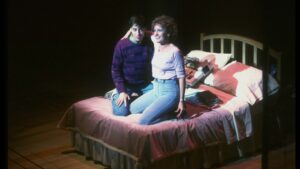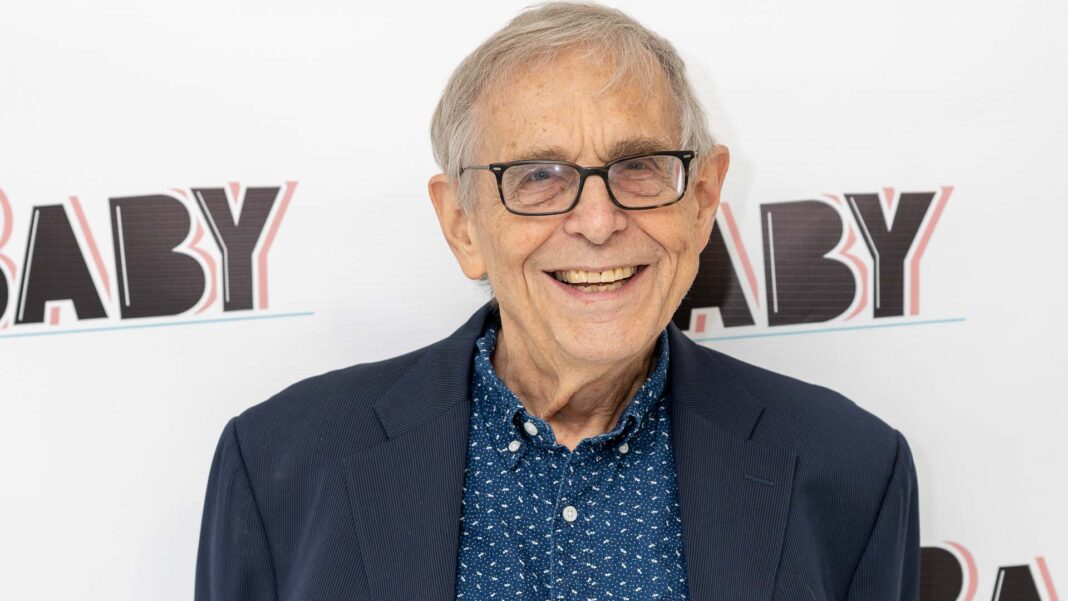
Yesterday was Valentine’s Day. You might be tempted to think that this celebrated day for lovers is bound to be one of the busiest days for procreation. Alas, it ranks 136th according to a 2019 study. But that decision as to when to try to have a baby is a profound one that transcends holidays. It’s a relationship-defining decision for every couple. Which made it perfect fodder for a musical as composer David Shire, lyricist Richard Maltby, Jr., and book writer Sybille Pearson realized.
Their musical, Baby, opened on Broadway in 1983 and received 7 Tony Award nominations including two for Maltby who also directed the production. In 2021 Out of the Box Theatrics produced a revival of Baby. Before it went into production, Maltby and Shire revised their musical to have a more contemporary perspective on parenthood.
To celebrate the musical’s 40th Anniversary, Yellow Sound Label has recorded that production. The new recording features revised lyrics and songs that had never been previously released.
Last week I spoke with Maltby about revisiting his baby, the tradition of re-working plays and musicals and how his perspective on the show may have changed over the four decades since it was first performed. What follows are excerpts from our conversation that have been edited for length and clarity. To see the full interview, please go to our YouTube channel.
How did it feel going back and becoming reacquainted with Baby?
When the recording was made and I listened to it for the first time it was like listening to the show for the first time. I kept thinking the lyrics are really good. If you work on a show you go past all the things that maybe are any good and you just concentrate on things that need to be fixed. You don’t pay attention to what an audience is actually following, which is, God willing, the the lyrics.
You don’t come on the show with the freshness that an audience brings to it. What’s remarkable and wonderful and scary about an audience is that they take what you give them. They’re interested in what you tell them to be interested in. If the lyrics are attractive or special they’re taking that in and on their way to understanding and enjoying the story. You forget that sometimes.
Given the intimate nature of the story I’m assuming the audience told you quite a lot when it was first performed.
Baby is an unusual show in that it’s about this incredibly intimate issue about a married couple. It goes to the primal thing that ties one person to another and forces you to go and confront what it is that makes that relationship. Or why you chose that person, what you really feel, what you’re afraid of and you dare not ever speak about it. But maybe forces you to speak about it.
I’ve always felt that we asked the cast of Baby to be more emotionally naked on the stage than any other show. Musicals tend to be a kind of fantasy of one sort or another. Some are real fantasies, but they’re all somewhat romanticized. This show forces you to actually go into the deepest part of yourself. I’m always pleased to hear how much being in a production of Baby has changed people because you suddenly realize you can go on stage and actually use that part of yourself which you are usually never asked to.
Was it deeply emotional for you to have to come up with what would be appropriate for these characters? I would assume you have to put yourself in their shoes.
There were several moments, quite a number actually, where we as writers hit some kind of a logjam. The answer always was that we were writing in a musical comedy way. We were not going into the service of the song. Why is this wrong? What do we know about the characters? We started by mentioning their age and suddenly realized we were that age. We were always thinking of this couple as the older couple. I was thinking of them basically as my parents. But no, they were a little over 40. You don’t feel old. You feel incredibly young. You feel energized. You don’t feel in any way defeated or downtrodden or that age has gotten to you in some way. We went into what we actually thought about our own marriages and our own lives and the issues and the problems that we had. Suddenly the song could get written.
Both of us being people who would rather be comfortable in a relationship than actually address something that might be a real issue, you know, that hurt our marriages. But it was certainly something we knew profoundly. The answer to the question is yes, we did absolutely go into ourselves all the time.
Was there a point at which something gets too close to home that it becomes uncomfortable either for a creator or an artist or is that just something you have to face if you’re going to create?
In any relationship, in any marriage, I would say there is some mutually decided upon area you don’t go to. There’s something you just leave alone. Something you’re afraid of. Something that you think is going to be so dangerous. The advent of a child makes you consider that you actually have to go in there and get there. That was true for all of the characters.
We specifically went out of our way to pick three couples that were in good relationships. We wanted to have people who belong together. If we had a relationship that was not a good relationship, the baby comes along and destroys that. No big surprise. Fact is that it is just as daunting, even more so, for a couple that thinks they are fine together and that everything is great.
This new recording is actually not the first revision you’ve made to the show. Baby was revised for Paper Mill Playhouse in 2004. How have your own personal life experiences changed from when you first wrote it to when you revised it 19 years ago to when it was most recently revised?
We were writing out of ourselves and we were three authors were white folks. And there wasn’t a Black voice on the stage there. One of the things about writing about who you are using yourself is that you therefore use yourself.
The Paper Mill production was racially mixed. That transformed the show in a wonderful way. What was interesting is you didn’t have to rewrite anything. Gay marriage changed the universe. It seemed that we needed to bring that into it.

Back when it opened my gay friends [had] like two reactions. One was the gay man who said, “I don’t care about children. I don’t care. This doesn’t touch me at all.” The other group was sad about being gay that they wouldn’t have children and so they wouldn’t have families like that. They missed that. I thought, Oh my God, we’re going to have to rewrite the whole score for that. But it turns out that the dynamics of the stories remain the same regardless of the details of the plot.
If you look at the revival of The Music Man that just closed some changes were made to the book. For Funny Girl Harvey Fierstein made some updates to the book. Aaron Sorkin is doing a new book for Camelot. What is your view on the importance of updating works of art to fit contemporary times? If the creators are not around to do that is it important for others to come in and adapt them for their times?
Well that is all it has ever been. I’m sure it was true of the Greek theater. After you had a show that was a big hit in Athens, you decided to play in Sparta. Somebody in Sparta decided to change the second act.
They didn’t have lawyers then who could prohibit that from happening.
The restoration comedy plays in the Cromwell period would be done with half the plot removed. It has always been been the case. Shakespeare was cut left and right in different versions. I did a production of A Long Day’s Journey Into Night in which we cut 45 minutes out of the play. I swear to God you didn’t notice they were gone.
But I also think the original is like Silly Putty – you can do whatever you want and you’ll let go and it’ll slowly go back to its original shape. Doesn’t matter how you change the ending of My Fair Lady, My Fair Lady will exist in its full version with that ending. Kiss Me, Kate! will exist with that ending. Every company will have to deal with whether they want that ending or another kind of ending. I don’t know what Aaron Sorkin is going to do with Camelot because that book really did need to be fixed. That didn’t need to be updated. It just needed to be made to work. If there’s anybody who could do that it’s Aaron Sorkin.
Listen, there are a lot of classic musicals that have either racial issues, racism of some sort or sexism or one sort. Sexism, certainly, because the premise of musicals was sexist. I mean, girls were babes. Girls were chorus girls and guys had all the funny elements. A certain amount of updating is to take care of stuff like that. You can’t do Thoroughly Modern Millie with the two Chinese comedy people. You can’t do the Chinese people in Anything Goes. Shows like Showboat you have to look at the original script and change a bunch of things. I think it’s okay so long as it is really thought through by a writer. If you just take something out because you don’t like it, it tends to fall apart, right? Not every character in a musical has to be likable.
Then there’s the whole idea that a lived-in experience is required for an actor to be able to play a role. I think diminishes the power of what acting is, doesn’t it?
I totally agree with you. I don’t really want to get into the the the idea of rehearsals being a safe place for actors. When did that ever start? When has a rehearsal ever been a safe place for an actor or anybody else? The whole point of rehearsal is that it’s not a safe place. It’s a place where you take terrible risks and humiliate yourself in pursuit of something.
Look at look at the rehearsal process that the Joe Gideon puts his dancers through when he’s trying to figure out a musical number in All That Jazz. That’s the process.
That is the process.
Since I brought up a reference to a Bob Fosse movie. You obviously did quite well [as director] with Fosse. His musical Dancin’ is coming back to Broadway this season. Clearly Bob Fosse’s legacy is going to continue for a long time. Have you thought about where your own legacy is going to be in 40, 50 years?
It crosses my mind every now and then. It’s funny, I had an exchange with Sondheim the year before he died when I was sort of complaining about that, saying, “Gee, I don’t know. I look at my work and how good is it?” He wrote me a bunch of very lovely notes saying, “It’s not your job. It’s your job to be as as truthful as you can be.” Then he proceeded to quote a line from an obscure musical that David and I wrote when we first came to New York – which is how we met Steve. He said, “Not a day goes by that I don’t remember that line of the lyric.” It was very moving because, of course, Steve thinks that with the legacy he’s got. He was thinking the same way. What does it add up to? How good am I?
One of the nice and horrifying things about musicals is that you’re a beginner on every show and no matter what you think, you learn from the last one. If you try to apply that to the next one, it won’t work. You have to kind of reinvent the wheel on every show if you’re doing it right. That means it’s terrifying and that means you’re scared and that means you feel inadequate and hopeless. And that’s fine. That’s just exactly what you should be.
To watch the full interview with Richard Maltby, Jr. please go here.
Main Photo: Richard Maltby, Jr. at the opening night of Baby (Photo courtesy Yellow Sound Label)











